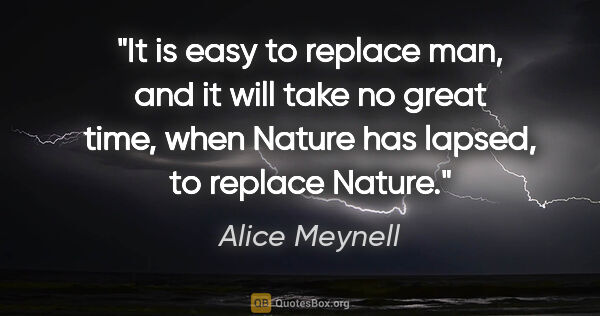Man And Nature Quotes (page 2)
You appear to me not to have understood the nature of my body & mind. Partly from ill-health, & partly from an unhealthy & reverie-like vividness of Thoughts, & (pardon the pedantry of the phrase) a diminished Impressibility from Things, my ideas, wishes, & feelings are to a diseased degree disconnected from motion & action. In plain and natural English, I am a dreaming & therefore an indolent man. I am a Starling self-incaged, & always in the Moult, & my whole Note is, Tomorrow, &...
Samuel Taylor Coleridge

the sounds next door served as a kind of trip wire: I seemed to stumble and fall on my face, skinning and bruising myself here and there and scattering my emotional and intellectual possessions. There was no point in pretending that I had not fallen, for when we are stretched out in the dirt we must pick ourselves up and brush off our clothes. This then, in a sense, is what I did, reviewing my considered opinions on marriage, constancy, man's nature, and the importance of love. When I had...
John Cheever
I have heard of a man lost in the woods and dying of famine and exhaustion at the foot of a tree, whose loneliness was relieved by the grotesque visions with which, owing to bodily weakness, his diseased imagination surrounded him, and which he believed to be real. So also, owing to bodily and mental health and strength, we may be continually cheered by a like but more normal and natural society, and come to know that we are never alone.
Henry David Thoreau
We are much beholden to Machiavelli and others, that write what men do, and not what they ought to do . For it is not possible to join serpentine wisdom with the columbine innocency, except men know exactly all the conditions of the serpent; his baseness and going upon his belly, his volubility and lubricity, his envy and sting, and the rest; that is, all forms and natures of evil. For without this, virtue lieth open and unfenced. Nay, an honest man can do no good upon those that are wicked,...
Francis Bacon
The real difference between God and human beings, he thought, was that God cannot stand continuance. No sooner has he created a season of a year, or a time of the day, than he wishes for something quite different, and sweeps it all away. No sooner was one a young man, and happy at that, than the nature of things would rush one into marriage, martyrdom or old age. And human beings cleave to the existing state of things. All their lives they are striving to hold the moment fast....Their art...
Isak Dinesen
We are afraid of the known and afraid of the unknown. That is our daily life and in that there is no hope, and therefore every form of philosophy, every form of theological concept, is merely an escape from the actual reality of what is. All outward forms of change brought about by wars, revolutions, reformations, laws and ideologies have failed completely to change the basic nature of man and therefore of society.
Thomas Jefferson
For after all what is man in nature? A nothing in relation to infinity, all in relation to nothing, a central point between nothing and all and infinitely far from understanding either. The ends of things and their beginnings are impregnably concealed from him in an impenetrable secret. He is equally incapable of seeing the nothingness out of which he was drawn and the infinite in which he is engulfed.
Blaise Pascal
His natural taciturnity was in his favour; nothing could be more calculated to give people, especially people with property (Soames had no other clients), the impression that he was a safe man. And he was safe. [...] How could he fall, when his soul abhorred circumstances which render a fall possible - a man cannot fall off the floor!
John Galsworthy
If love could force my own thoughts over the edge of the world and out of time, then could I not see how even divine omnipotence might by the force of its own love be swayed down to the world? ...how it might, because it could know its own creatures only by compassion, put on mortal flesh, become a man, and walk among us, assume our nature and our fate, suffer our faults and our death?
Wendell Berry
As a Scot and a Presbyterian, my father believed that man by nature was a mess and had fallen from an original state of grace. Somehow, I early developed the notion that he had done this by falling from a tree. As for my father, I never knew whether he believed God was a mathematician but he certainly believed God could count and that only by picking up God's rhythms were we able to regain power and beauty. Unlike many Presbyterians, he often used the word "beautiful.
Norman Maclean
A kind and generous man by nature, he had stumbled, by chance, over that common Philosopher`s stone (much more easily discovered than the object of the alchemist`s researches), which sometimes trips up kind and generous men, and has the fatal property of turning gold to dross and every precious thing to poor account.
Charles Dickens